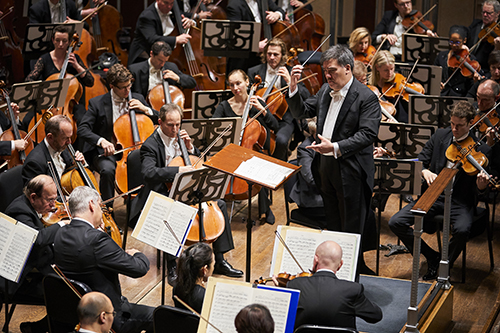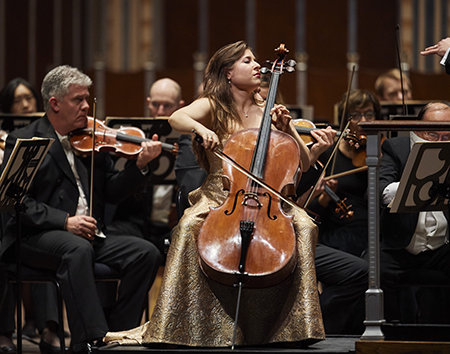by Daniel Hathaway
A tone poem and a symphony by Antonín Dvořák framed Samuel Barber’s dauntingly virtuosic Cello Concerto at Severance Hall on Thursday evening, March 15, when Alan Gilbert and Alisa Weilerstein returned for guest appearances with The Cleveland Orchestra. Weilerstein’s performance of the rarely-heard concerto was as breathtaking for its virtuosity as her encore of a Bach sarabande was for its simple poignancy.
Written for the large-handed Russian cellist Raya Garbousova and commissioned by Serge Koussevitzky and the Boston Symphony — how many new works came about through that partnership? — this concerto is not for the faint of heart or short of reach. Weilerstein commanded it from its striking opening gestures, filling the house with her warm, intense tone even when the musical material was angular and jagged.
A description of the work would be futile — or would at least go against the composer’s explicit wishes. As Hugh Macdonald’s program notes reported, “Barber himself said of the concerto that it progresses on ‘its own musical terms, which do not call for verbal description or analysis.’” That neatly lets commentators and critics off the hook, except to describe the performance on Thursday as quite literally stunning — and to add that you had to be there to hear that for yourself.
The cathartic encore was the Sarabande from J.S. Bach’s fourth cello suite, with both repeats deliciously observed. Nothing could have been more different from the Barber, and nothing more appropriate afterwards.

Trilling woodwinds, sinister brass, broad melodies, and a brassy march testified to the composer’s fine ear for orchestral color, and a pair of tubas added extra profundity to one mellifluous passage of cellos and low brass. A persistent, three-stroke knocking gesture and the ringing of vesper bells contributed dramatic sound effects to the story. Gilbert and the Orchestra gave the tale a thrilling narration.
The concert ended with a somewhat puzzling performance of Dvořák’s ever-ebullient Eighth Symphony — a work that most often successfully plays itself, but onto which Gilbert seemed intent on imposing his own stamp. Rather than encouraging an old world sound and drawing out melodies to their full, lyric extent, he went for the brash, the fussy, and the episodic.
In a Bachtrack interview this month, Le Figaro critic Christian Merlin discussed tonal differences among orchestras. “Cleveland doesn’t sound like Chicago which doesn’t sound like Boston or Philadelphia… And when we say that an American orchestra is synonymous with a super-powerful, ringing sound with up-front brass, that might be the case in New York or Chicago, but in Cleveland? Not in the slightest!”
Photos by Roger Mastroianni.
Published on ClevelandClassical.com March 21, 2018.
Click here for a printable copy of this article



